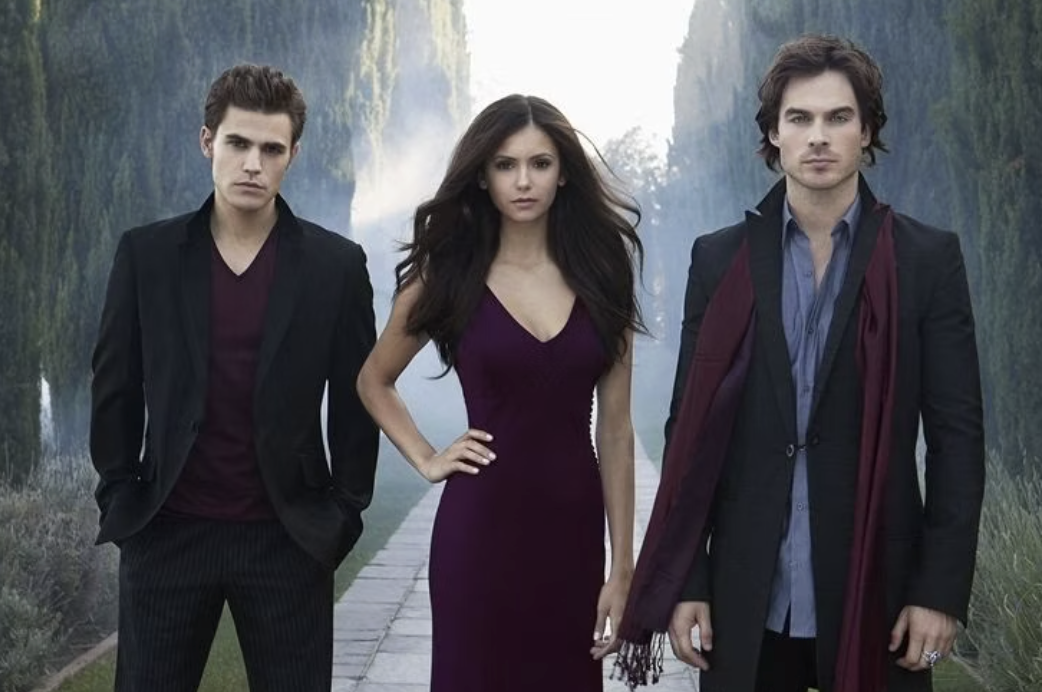Your Love of Vampires Explains Why You Attract Toxicity- But it’s Not Your Fault
By: Affiah Sangare
If there is one thing I’ve learned from the past decade, it’s that America loves bad men. They dominate our politics, economics, and importantly for this article, pop culture. This isn’t a new phenomenon; our love of bad boys extends back centuries to Dracula and the “rakehell” archetype. There is something about a villain that has us in a chokehold. Since Halloween is approaching, I want to zoom in on two bad boys who we loved growing up: Damon Salvatore and Edward Cullen.
One could argue that Edward Cullen is not a bad boy but simply misunderstood. Spoiler alert, he literally killed people. I'm not saying it wasn’t justified, but it still makes him a murderer. Jokes aside, a bad boy isn’t just a man who wears leather jackets or a literal boy who is bad. It’s a cultural archetype within our media; a romanticized image of a tortured boy with a dark past or dysfunctional family that comes from the wrong side of the tracks or is his family’s black sheep. He’s going through a storm of emotions and has a sensitive spot that nobody but the right people get to see. We’ve seen that specific image since the 1950s with James Dean in “Rebel Without a Cause,” but we never talk about what it does to the young girl’s psyche in trying to be that right person for the bad boy.
Both “Twilight” and “The Vampire Diaries” both had complex portrayals of this trope. The problem that I’m proposing is not that these men are too good to be real, as we ascribe many fictional men. The issue that I have is that even if Salvatore or Cullen did exist in real life, they would be extremely destructive men that we would not glamorize. But there are reasons why we glamorize them and a big one is their vampirism. Throughout literature, vampirism has been symbolized as “the other,” whether that manifests in being a foreigner like in Dracula or a societal other like in “True Blood” or “Interview with the Vampire.” Romance in vampirism represents a tango with that “other” and a drift away from societal expectations. That’s why most romance media with vampirism focuses on teen girls as that is the time to explore other identities and to test out different intrigues.
The Salvatore brothers somewhat defy this trope as “the others;” they conform to the town’s ideals by being a part of the Founding Families. Stefan joins the football team and Damon, despite doing it in self-interest, becomes a part of the Founder’s Council. Even though Stefan was the original love interest for the main character, Elena, it was Damon that stole the spotlight and won both Elena’s and our hearts. Their love story is written and marketed to young women as “the villain who gets the girl.”
Credit: Heute
In real life, the story would play out as a psychotic older man that manipulated a young woman with abandonment issues into a relationship. We often ignore the age gaps in vampire stories because it ruins the fantasy of it all. But it’s harmful to young girls who watch and are led to think that it’s cool to be with an older guy. Edward’s situation is morally grey because he “died” when he was 17, so he is stuck at 17. Damon Salavtore, however, “died” when he was 25 and met Elena when she was a 17-year old high school junior. Damon, like Edward, kills people but unlike Edward, Damon torments one of Elena’s friends, Caroline, against her will. He also kills her brother and her best friend’s (justice for Bonnie) mother.
At the core, these actions have the intentions of further isolating and alienating Elena. His actions are so irredeemable that in turn, she becomes unrepentant by association and has no one but him. Damon carries out that idea throughout the show and it’s written off as simply toxic or Damon “being Damon,” not abusive. Picture that, a 25 year old man that gets with a girl he knew since she was a high school junior and isolates her from her family and friends through his reckless behavior. If Damon was a real life man, if he didn’t look like Ian Somerhalder, just how charming and illusive would the audience find him? Would they still think that he deserves Elena like she’s a prize instead of a person? Also, he was a Confederate soldier and the show kind of just skips past that; like I said, justice for Bonnie.
Just by mentioning Damon, I think that made Edward Cullen look like a saint. His age gap with Bella is less egregious even though he is 104 years old when he meets Bella. He acts more like a father figure to Bella than her actual father and does it under the guise of protecting her. It is somewhat justifiable as he is leading her into a new supernatural world. It becomes less justifiable when he tells her that he stalks her while she’s sleeping. The stalking becomes the epitome of just how obsessive and controlling he can be. Bella can’t seem to function without Edward; she is obsessed with Edward nearly as much as she is with being a vampire. She puts herself at risk just to hallucinate about him. Is that a productive message to young women on how to handle breakups? Put yourself in dangerous positions in order for him to come back because he should be that centered in your life to the point where he is your savior?
While their relationship is written as being equally obsessive, it’s clear that on one side is more harmful. Edward’s controlling behavior is written off as romantic and devoting instead of isolating and creepy. I know friends that would fantasize over the fact that Edward stalked Bella in order to protect her. This is fine for fantasy, but how can young girls truly separate it from reality? The idea of a man watching us sleep and getting enjoyment out of it is off-putting to grown women. Yet to young girls that love “Twilight,” especially if that man looked like Robert Pattison, that might just sound appealing. “Twilight” is one of the biggest romance stories of our generation and that’s what we grew up on. Obsession masqueraded as devotion, turning a blind eye to huge red flags, and becoming debilitated after heartbreak because that is all our lives are summed up to. That works for Bella because she’s fictional but fiction can slip into real life if we're not careful.
The bad boy archetype was originally something for young men to relate to; a sensitive soul crushed by the expectations around him and severely misguided due to having no strong authority figures. But when translated into teen girl media, that archetype can stretch to something drastically different. The bad boy is no longer a symbol of youthful freedom but actually a weight that usually ties the female protagonist down. He becomes a test on how much women should take for the reward of a man. Can you take a man being way older than you? Can you take him stalking you? Can you take him isolating you from friends and family? Can you take him leaving you without a single sign and causing you to fall into borderline psychosis? If so, congratulations you have won the gift of marriage (yes, it’s always marriage) because you loved him that much. None of that bad stuff mattered anyways because he loved you and you loved him, right?
I’m not saying never to watch “Twilight” or “The Vampire Diaries” because I would be a hypocrite. I’m also not saying that you can’t enjoy these characters or indulge in your comfort movie/show. I am saying that when you rewatch them, ask yourself if seeing any of those things on screen ever conditioned you to accept behavior replicated in these pieces of media. I am also saying that maybe you don't need an Edward or Damon in real life because that would suck tremendously; yes, even if they’re hot.

